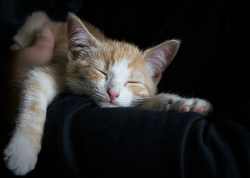Keeping them in
Not so long ago, it was common for cats to be allowed out at night to roam freely and fulfil their natural instinct to hunt. These days, many owners are preferring to have their cats inside at night, where they feel they are kept safer.
With one in four cats killed on the road – usually at night – it isn’t surprising. At night, car headlights can dazzle cats, meaning they’re more likely to get hurt or killed. Cars also regularly exceed the speed limit at night when the roads are quieter, putting cats at greater risk of being hit.
But road accidents aside, there are other reasons why allowing your cat to roam at night can be dangerous. Attacks on domestic cats by foxes, while uncommon, aren’t unheard of. Likewise, fights between other neighbourhood cats tend to happen at night, which can leave your cat with serious injuries and diseases.
Infestation is another common problem in cats that hunt, as fleas and other parasites are picked up from prey and the environment.
Loss can also occur at night, as dropping temperatures send cats hurrying in search of warmth and shelter. This can sometimes lead them into danger, as they retreat inside sheds and garages, or even car engines, to escape the cold. It’s fairly common to hear that a cat has gone missing, only to be found 3 weeks later trapped inside a neighbour’s garage! 
Letting them out
Understandably though, many cat owners still prefer to give their cats round the clock access to the outdoors, believing it to be the most natural thing. Some cats are used to this routine, so confining them can lead to extreme stress and related negative behaviours.
For those living in rural areas away from main roads, it is far safer for cats to venture out at night than for cats living in busy, urban areas congested with traffic. It very much depends on where you live and your cat’s personality, as particularly nervous cats may prefer to be kept in.
Ensuring their safety
To minimise the risks to your cat, it is important that they are vaccinated against all infectious diseases and are microchipped for easy identification. A collar containing your contact details will also help with this, but make sure you choose one with a quick-release feature to avoid it becoming caught and injuring your cat.
Regular fleaing and worming will also protect your feline from parasite infection from prey and the environment.
Likewise, ensuring your cat is neutered or spayed will also help reduce the risks to them outside, as unneutered animals will wander for miles (often crossing busy roads) and are more likely to get into fights. They also cause more noise and smell nuisance to neighbours than neutered cats, and the risk of pregnancy to unspayed females is obvious.
It is important to be mindful of wildlife too, as populations of some species are being decimated by hunting cats, so keeping them inside at night can go some way towards supporting their survival.
We'd love to hear your thoughts on this, so please let us know whether your cat stays inside or has the freedom to wander :)
Written by: Hannah








